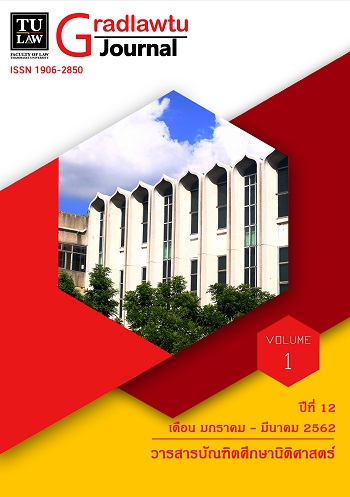การกำหนดความผิดอาญาฐานบุกรุกเพื่อไปกระทำความผิดฐานอื่น
คำสำคัญ:
การกำหนดความผิดอาญา, การบุกรุก, การบุกรุกเพื่อไปกระทำความผิดฐานอื่นบทคัดย่อ
การกระทำความผิดบุกรุกที่เกิดขึ้นล้วนแล้วแต่เป็นการกระทำที่ผู้กระทำมิได้มีเจตนาเพียงเพื่อถือการครอบครองหรือรบกวนการครอบครองอสังหาริมทรัพย์ของผู้อื่นตามบทบัญญัติที่ปรากฏในประมวลกฎหมายอาญาไทยในปัจจุบัน แต่ผู้กระทำมีเจตนาการกระทำและพฤติการณ์ที่ร้ายแรงมากกว่านั้น กล่าวคือเป็นเจตนาประสงค์จะกระทำความผิดอื่นซึ่งล้วนแล้วแต่เป็นการกระทำอันเป็นความผิดทางอาญาทั้งสิ้น ยิ่งไปกว่านั้นผู้กระทำจะมีความรับผิดในส่วนของความผิดอาญาอื่นก็ต่อเมื่อการกระทำความผิดอาญาอื่นนี้ต้องถึงขั้นลงมือกระทำความผิดเสียก่อน มิเช่นนั้นผู้กระทำก็จะมีเพียงความผิดฐานบุกรุกเท่านั้น ทั้งที่ผู้กระทำมีเจตนาและพฤติการณ์บางประการอันเกี่ยวกับความผิดฐานอื่นซึ่งเกินกว่าความผิดฐานบุกรุกนั้นแล้ว จึงเป็นกรณีที่บทบัญญัติและการลงโทษของกฎหมายไทยในกรณีดังกล่าวไม่ได้สัดส่วนกับการกระทำความผิดที่แท้จริง ดังนั้นจึงมีความจำเป็นที่จะศึกษาถึงความเป็นไปได้ของกำหนดความผิดอาญาสำหรับการบุกรุกเพื่อไปกระทำความผิดฐานอื่น
เอกสารอ้างอิง
2. Douglas Husak. Overcriminalzation : The Limits of the Criminal Law. New York : Oxford University Press, 2008.
3. Herbert L. Packer. The Limits of the Criminal Sanction. California : Stanford University Press, 1968.
4. H.L.A.Hart. Punishment and Responsibility Essays in the Philosophy of Law. New York : Oxford University Press, 1968.
5. M N Venkatachaliiah and V R Manohar, Ratanlal and Dhirajlal. Ratanlal & Dhirajlal's The Indian Penal Code. 32rd ed. Haryana : LexisNexis, 2013.
6. Nigel Walker. Punishment, Danger and Stigma : The Morality of Criminal Justice. Oxford : Basil Blackwell, 1980.
7. NiNa Peršak. Criminalising Harmful Conduct : The Harm Principle, its Limits and Continental Counterparts. New York : Springer Science+Business Media, 2007.
8. Patrick Devlin. The Enforcement of Morals. Oxford : Oxford University Press, 1981.
9. Stanley Yeo, Neil Morgan, Chan Wing Cheong. Criminal law in Malaysia and Singapore. 2nd ed. Singapore : LexisNexis, 2015.
ดาวน์โหลด
เผยแพร่แล้ว
ฉบับ
ประเภทบทความ
สัญญาอนุญาต
บทความหรือข้อความคิดเห็นใด ๆ ที่ปรากฏในวารสารบัณฑิตศึกษานิติศาสตร์เป็นความรับผิดชอบของผู้เขียนบทความโดยเฉพาะ คณะนิติศาสตร์ มหาวิทยาลัยธรรมศาสตร์ และกองบรรณาธิการไม่จำเป็นต้องเห็นด้วย



